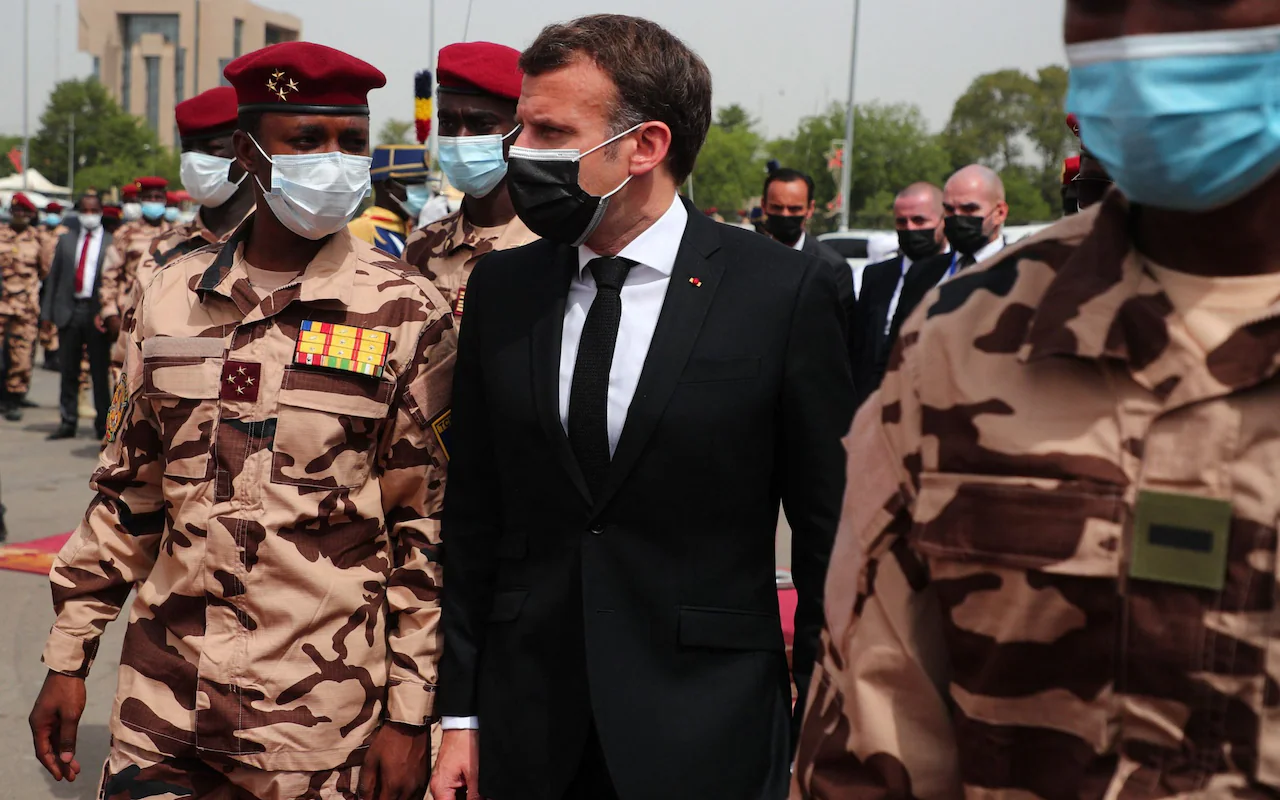Killing of Chadian president shines light on Macron’s dubious decision to back a Libyan warlord
Emmanuel Macron touched down in Chad on Friday to pay his respects to one of France’s indispensable African strongman, a warrior king allegedly killed on the battlefield in a murder mystery troubling Western leaders.
President Idriss Déby Itno was killed suddenly as he visited his troops facing down a heavily armed Russian-trained rebel force that had made a blitzkrieg dash across the Sahara to capture Chad’s capital, N’djamena.
The facts around the dictator’s death are murky and conspiracy theories abound. The official Chadian version of events says Mr Déby was a martyr; the Field Marshall was shot in the chest after shouting at his men to drive him to the frontline to face down a column of terrorists.
However, analysts say it is still unclear how the central African nation’s dictator of 30-years died.
But as the French President sat in N’djamena’s national square on Friday listening to the 21 cannon salute, one thing is clear: a French foreign policy blunder.
The Chadian rebels — the Front for Change and Concord in Chad (FACT) — who swept out of Libya some two weeks ago in about 400 to 450 vehicles had fought for years as mercenaries in Libya’s Civil War under General Khalifa Haftar.
Over the last few years, Russia, the United Arab Emirates and France have backed Mr Haftar to the hilt, as they vie for influence in the oil-rich lawless nation.
France sent special forces into Benghazi to help Mr Haftar in 2016, provided aerial support and has thrown its diplomatic weight behind the warlord. This power play may have backfired spectacularly.
“It’s a monumental screw up for France. Paris put everything on Déby. They didn’t have a plan B. Then they backed a faction in the Libya Civil War, and it has blown back on them and taken out their main ally in Africa,” said Nathaniel Powell, author of ‘France’s Wars in Chad: Military Intervention and Decolonisation in Africa.’
France never really left Chad after it granted independence to its former colony in 1960. Instead, French troops have always tried to maintain a presence in the vast desert nation six times the size of the UK, using it as a base for operations across the Francophone region.
Paris has coddled successive Chadian autocrats and consistently turned a blind eye to rampant tribal nepotism, corruption and human rights abuses which have kept the country’s 15m people some of the poorest on earth.
Since the 1990s, Mr Déby has been France’s go-to dictator in Africa, a client autocrat with a well equipped, professional army to balance Paris’ regional security strategy on.
France’s 5,000-solider Operation Barkhane, which fights jihadis across the vast arid expanse of the Sahel running underneath the Sahara, is based out of the Chadian capital.
Mr Déby’s troops have also played a crucial role in fighting powerful jihadi groups allied to Al Qaeda and Islamic State across the Sahel and the Lake Chad Basin.
France has intervened multiple times to protect Mr Déby in the past from coup attempts to rebellions. In 2019, French airstrikes stopped another column of rebels on their way to oust the dictator.
But this time, the French did not act to save Mr Déby. Upcoming French presidential election may have played on the mind.
FACT was formed in Libya in 2016 by Chadian officers opposed to Mr Déby’s rubber stamp democratic system and his use of the country’s oil money.
In February, a United Nations report said that FACT fighters were based at a major military airbase in Al Jufra, in central Libya.
The airfield was also a base for Russian mercenaries from the Kremlin-linked Wagner group and a key site where the UAE flew weapons in en masse to supply Mr Haftar’s forces.
While they worked for Mr Haftar, the FACT rebels received training from the Russians and large amounts of UAE weapons. However, there is no evidence to suggest that either power played a role in the rebel advance south.
Jalel Harchaoui, Senior Fellow at the Global Initiative Against Transnational Organised Crime, says much of the responsibility for Mr Déby’s death lies with his generals.
“For several or eight days, the whole world knew FACT were driving towards N’djamena. But Déby’s generals did not fully mobilise Chad’s land forces. There was an ambivalence and a lack of cohesiveness around the president. Regardless of who physically killed him, his generals share a great deal of responsibility for his death,” says Mr Harchaoui.
After Mr Déby’s death, his 37-year-old four-star general, Mahamat Idriss Déby Itno, has now taken control of the country at the head of a military council.
The military council claims that elections will take place after 18 months — few have any doubt who would win.
Although this power grab is in explicit contradiction of the Chadian constitution, which says that the head of the national assembly should run the country in the event of the President’s death, it is hardly surprising.
Despite massive opposition from Chadian civil society groups, the Élysée Palace has doubled down on Mahamat Déby.
“We will not let anybody put into question or threaten today or tomorrow Chad’s stability and territorial integrity,” Mr Macron said on Friday at the funeral.
Critics say the move reveals France’s double standards on democracy in its dealings with its former African colonies. When a military junta ousted Mali’s president in 2020, France demanded a “return to constitutional order”.
“The whole argument the French always made throughout the last few years about why they supported Haftar was that he could stabilise the region,” said Wolfram Lacher, a Libya researcher at the German Institute for International and Security Affairs.
“Now their main ally in the Sahel is dead.”

